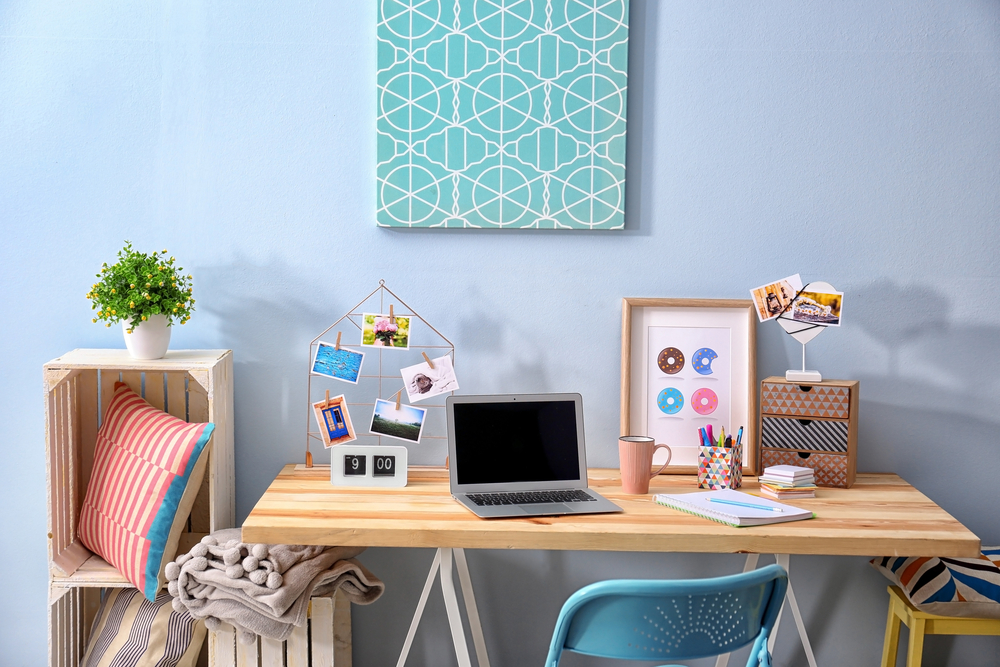The creation of a conducive and effective study area is crucial for students who want to achieve academic success.
A well-designed study space will significantly affect focus, motivation, and efficiency. Keep in mind that the most important thing is to find the right balance between function and personalization to create an environment that stimulates and aids in your learning. In this post, we’ll examine some of the best design ideas to create a stimulating study area that helps you concentration and improves learning.
Integrate Technology judiciously
In today’s digital world technology is an integral aspect of education. Many students use internet-based resources like essay writing services for their academic essays written, and much more. However, technology’s presence must be carefully managed to stop it from causing distracting factor. The best way to position your laptop or computer is so that there is less reflection and glare on your screen, which allows you to have a comfortable and a focused time on the screen.
You should consider using headphones that noise cancelling to block out external noises especially in noisy and crowded areas. Organise your studies materials and digital files efficiently to minimize the time you spend searching for information. If you are able to integrate technology with care you will reap the benefits of technology without degrading your ability to focus.
Enhance Lighting
One of the most important factors that greatly impact the efficacy of a study area is the lighting. Natural light is best therefore, if it is possible it is best to place your study space close to windows. Natural light reduces eyestrain and increases concentration, creating a relaxed and comfortable environment.
If the natural light is scarce you should consider investing in a high-quality artificial lighting. Use daylight bulbs or LEDs that are akin to natural light, increasing concentration and decreasing the risk of fatigued eyes. Look into adjustable lighting fixtures that manage both the brightness and angle permitting you to adjust the lighting to suit your needs for studying.
Related: Teach Yourself Graphic Design: A Self-Study Course Outline
Select Ergonomic Furniture
The furniture you choose for your study space is vital for your comfort and wellbeing during your study sessions. Make sure you have an ergonomic chair that is able to support your back and encourages a healthy posture. A chair that is comfortable can help prevent irritation and distraction which allows you to concentrate in your study for extended time.
Also, think about the design and height the desk. Make sure it’s big enough to hold your study items, including textbooks notebooks, notebooks and laptops. A clean workspace can lead to better organization and makes focusing to the work at hand much easier.
Customize and Reduce Distractions
Making your study space reflect your individual style and preferences will create an comfortable and uplifting atmosphere. Decorate your space with inspirational artwork, quotes or plants that give an element of color but without being distracting. Select colors that create peace and focus, like blues, greens or neutrals.
However it’s essential to reduce the possibility of distractions. Make sure your study area is clean and tidy, eliminating distractions that could distract your attention. Switch off or disable your mobile phone to avoid distractions from distracting you.
Create a cosy atmosphere
The general atmosphere of your work space could dramatically affect your mood as well as productivity. Be aware of the temperature and airflow to create an environment that is comfortable. A good ventilation system prevents congestion and a comfortable temperature makes for an enjoyable study experience.
Include elements that encourage relaxation by incorporating a relaxing carpet or cushion for making the room welcoming. Think about adding white noise or background music to help you focus and focus, but make sure that the sounds aren’t too distracting.
The Final Words
Designing a space for study that is productive is a bespoke process that requires careful attention to details and consideration of personal preferences. You can create an environment for studying that improves concentration and aids in learning success by optimizing lighting and furniture that is ergonomic, designing your space to suit your needs and incorporating technology with care and creating a relaxing environment.





